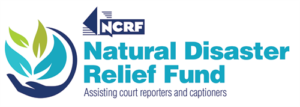How many languages do you know?
I know English and steno. 61.2%
I know English, steno, and one more (but not fluently). 28.5%
I know English, steno, and one more language that I use regularly. 5.8%
I know English, steno, and more than one other language but not fluently. 4.6%

Last week’s JCR Weekly poll question asked about how many languages NCRA members know in addition to English and steno. Responses showed a number of multilingual people, and some of them attributed knowing other languages to helping them succeed in their work.
D’Arcy McPherson, RDR, CRR, CRC, CMRS, CRI, is a captioner in Victoria, BC, Canada, who also knows French.
“I have spoken French since I was a child,” McPherson said. “I do think that a second language was helpful in lowering the mental roadblocks to understanding steno theory. Having both English and French is extremely helpful and has been essential in my employment.”
John Román-Martínez, CMRS, CRI, CPE, a freelance court reporter in Old San Juan Sta., Puerto Rico, said knowing Spanish affected how he learned steno. He said he has also found that “realtime in the Spanish language is doable in an English language software platform.”
Phyllis Waltz, RMR, CRR, CRC, a freelance reporter in Pearland, Texas, has studied German and Spanish. She said she doesn’t feel that speaking another language helped her learn steno.
“Speaking is different than immediately translating to a different ‘written’ language,” Waltz said. “I understand enough Spanish to know when the interpreter is not translating everything accurately and fully. Lawyers will brag about using a court reporter who also speaks Spanish because it saves them money. Of course, none of the court reporters who do that are RPR certified. I inform the lawyer that is illegal, as they are not certified interpreters and the lawyer is risking their record. I have begun asking interpreters for their certification number before the deposition and note it on the appearance page. It is very obvious when the interpreter is not certified.”
Lisa Selby-Brood, RMR, a freelance reporter in Clearwater, Fla., also knows Spanish and said that it has proven invaluable living in Florida.
“It didn’t necessarily affect how I learned steno, but it has certainly come in handy recently in my job with steno,” Selby-Brood said. “I can pretty much follow the gist of the conversation when I have a Spanish interpreter. Sometimes I’ve known what the person said in Spanish, and it was not translated properly, to me, but then that’s not my job to say anything. However, I remember one specific job where the interpreter was so bad I remember thinking to myself, man, I think I could do a better job than she’s doing. Sure enough, at the end of the deposition — I’m not sure why he waited — but one of the attorneys put on the record that he did speak Spanish, he was not satisfied with the interpreter’s abilities. In fact, he stopped and corrected her translations several times in the deposition and that he just wanted to state that on the record.
Selby-Brood pointed out another benefit to knowing other languages.
“I just think it helps if you know some language, especially one that’s spoken in the area where you live,” she said. “It’s also kind of fun to have everyday words from that language in your dictionary, in case the attorney throws in a few words there, like no mas, no bueno, and, hey, if that’s what he says on the record, it has to go in the transcript like that!”
Devora Hackner is a freelance reporter and CART captioner in Brooklyn, N.Y., who also knows Yiddish and Hebrew.
She said knowing those languages affected how she learned steno.
“Hebrew is a phonetic language. The vowels in Hebrew always make the same sound regardless of what letter/vowel comes before and after,” Hackner said. “It’s very unlike the English language but very similar to the phonetics of stenography/shorthand. I also believe that knowing another language gives one confidence that it’s possible to add yet another language.”
Hackner also said that knowing other languages helps her connect with people from different backgrounds or cultures.
“Being able to communicate with them in their language of choice sets the stage for a great working environment!” Hackner said. “Even if you know just a few Russian words, for example, it makes the other party feel engaged.”
Sue Garcia, RPR, is a freelance reporter and CART Captioner in Tacoma, Wash. She knows Spanish, French, Mandarin Chinese, some Italian, modern Greek, and some American Sign Language (ASL). She said knowing other languages absolutely affects how she learned steno, and she has always felt it is an underappreciated link to learning steno.
“From rote memorization of steno words to root words, prefixes, and suffixes, phonetic parsing of words, I feel all of that made learning steno, and continuing to evolve my writing, a very smooth process,” Garcia said.
She also thinks it affects how she does her job.
“English is, in my opinion, a mutt language that has enveloped so much vocabulary from other languages,” Garcia said. “Due to my wide and varying knowledge of foreign words and pronunciations, I have a solid foundation in finding spellings and cultural references that come up so often. The ASL is useful in communicating with my CART clients who use it, but I really need much more.”







